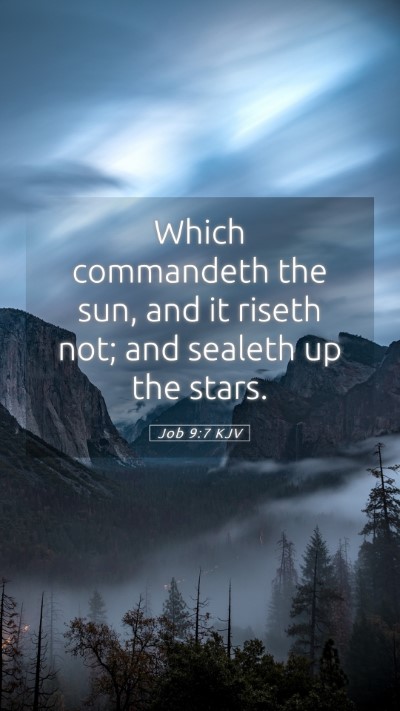Understanding Job 9:7
Job 9:7 states: "He speaks to the sun and it does not rise; he seals off the stars." This verse captures a profound moment in the dialogue of Job, reflecting on God's supreme power and the insignificance of human efforts in comparison. In this analysis, we will explore the Bible verse meanings, interpretations, and commentary from respected theologians such as Matthew Henry, Albert Barnes, and Adam Clarke.
Bible Verse Meaning
In Job 9:7, Job expresses the notion that God has control over natural phenomena. The imagery of speaking to the sun, which does not rise, suggests that God has authority over creation itself. Job's lament illustrates both the immensity of God and the frailty of humanity when faced with divine will.
Insights from Commentaries
-
Matthew Henry's Commentary
Henry emphasizes that this verse showcases God’s omniscience and omnipotence. He argues that God is so powerful that even nature must obey His commands. The act of sealing off the stars reflects the idea of divine authority over the celestial bodies, questioning Job's understanding of the divine order.
-
Albert Barnes' Notes
Barnes points out that this verse illustrates the futility of human attempts to challenge God's will. It reiterates the idea that natural laws are not autonomous but are under God's control. Barnes invites readers to consider how Job's plight serves as a lesson in humility before God’s grandeur.
-
Adam Clarke's Commentary
Clarke offers insight into the poetic nature of this passage, noting that Job's expression is reflective of the ancient world’s perception of cosmic order. He explains that "sealing off the stars" symbolizes God's ability to restrict the natural elements, thereby illustrating His omnipotent nature that governs all existence.
Scripture Analysis
Job's declaration in this verse is part of a larger discourse, where he grapples with the justice of God amidst his suffering. Job understands that even though he questions God’s decisions, he acknowledges God’s ultimate authority. This highlights a central theme in the Book of Job: the struggle for understanding divine justice.
Theological Significance
The theological implications of Job 9:7 encompass divine sovereignty, human suffering, and the limits of human understanding. This verse serves as a reminder that God's ways are mysterious and beyond human comprehension, encouraging deeper reflection on our personal faith and understanding of suffering.
Application of the Verse
This verse calls believers to trust in God’s providence, even when circumstances seem dire. It provides a framework for understanding the trials of life as part of a larger divine narrative, pushing believers to seek a deeper relationship with God and to find solace in His ultimate control over creation.
Related Bible Cross References
- Psalm 104:19 - "He made the moon for the seasons; the sun knows its setting."
- Isaiah 40:26 - "Lift up your eyes on high and see: who created these?"
- Job 38:12-13 - "Have you commanded the morning since your days began?"
- Proverbs 21:30 - "No wisdom, no understanding, no counsel can avail against the Lord."
- Romans 11:33 - "Oh, the depth of the riches and wisdom and knowledge of God!"
Conclusion
Job 9:7 is a powerful reminder of the grandeur of God and the limitations of human understanding. As we reflect on this verse, we are called to expand our Bible verse commentary and scripture analysis as a means to deepen our faith and understanding. Engaging with these insights encourages believers to explore the Scripture more thoroughly as part of their Bible study lessons.


